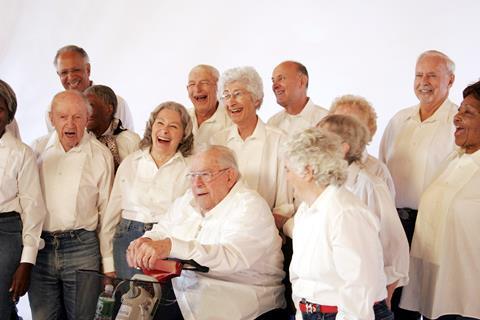On the International Day for Older Persons, Jill Harris argues that the quiet faithfulness of older Christians is just what an anxious generation needs

A bunch of elderly has-beens stood there on the stage. Goodness knows what they had been in their time - secretaries, welders, teachers, plumbers, business leaders – nothing in their appearance gave it away. At 70-something, a kind of sameness creeps in. Women get rounded tummies and plump hips; they wear their hair like a silver helmet and dress in stretchy trousers and plain tops. Men have thin - or no - hair and wear sweaters knitted by their wives. Some have walking sticks and bandy legs.
But when these men and women started to sing, their age and appearance became irrelevant. The tunes were so vibrant and beautiful, I forgot the slight quiver in their voices, the tendency to warble. At the front, images were projected onto a screen to complement the songs: a field lit by sunlight, a small hand, held in a larger one, a cross against the sky. I was introduced to songs that I had never heard before and reminded of others I had long forgotten about.
Does an emphasis on ‘excitement’ really make the Church more relevant?
This was a holy week meditation and music event in a local Methodist church. There were readings from the Gospels and a couple of poems read aloud by church members, from which the choir was also drawn. Outside, the church looked inviting, the lights blazing through the stained-glass windows on to the street like a yellow furnace.
Standing prominently at a crossroads of a busy shopping area, you couldn’t miss it. There were posters on the railings advertising holy week activities, and the doors were thrown open for visitors. But how few were there. Perhaps 30 people in the congregation, and most of us were over 60.
A sign of the times
For an hour, through Bible readings, songs and poems we were drawn into the drama of Jesus’s life as he approached the climax of his time on earth. Condemnation at the hands of evasive authorities. Abandonment by his closest friends. The dereliction of a lonely death. The hymns and songs reflected the bleakness of his experience. Who could fail to enter into the mood, or draw comfort from his dredging the depths of human experience?
After the service, there were refreshments in the hall, where dark, unappetising coffee was drunk from mugs at orange plastic tables. We left and braved the chill March evening to go home and warm up. But I wouldn’t have missed it for anything.
These stalwarts of the Methodist Church reflect the demographics of our most of our mainstream denominations. It is a cause of angst among many church leaders. If the trend doesn’t change, they say, churches will close, and where will that leave them? To avoid this scenario, they introduce all manner of things to attract younger people: raves in the knave, silent discos and helter-skelters. The logic is impeccable, but is our God’s work limited to logical progression?
So what if some church congregations consist mainly of older people? Does it mean their message - or their way of delivering it - is irrelevant? If so few people have grasped the solemnity of holy week sufficiently to spend an hour in contemplation, perhaps it reflects a change in our values as a society, rather than a failure of churches to attract the young.
Reaching for relevancy
Somewhere along the line our country decided Christian faith wasn’t a priority. And people lost the habit of faith as it vanished from their sight.
From where I stand, it looks as if some churches are more interested in having fun than in quiet reflection. Free breakfasts, cake after services, quasi-rock music performed by aspiring rock stars and an emphasis on ‘excitement’ seem to be the order of the day. Does it really make the Church more relevant?
So what if some church congregations consist mainly of older people?
What if, in every generation, there are souls longing for a glimpse into the heart of God? A heart that will acknowledge their lostness and difficulty. A heart that doesn’t turn everything into ‘fun’ but takes them seriously at their darkest times. What if today’s young people are longing for relationship with such a God? What if it lifted them from the tsunami of anxiety they are reportedly experiencing? What if it could speak into the maelstrom of confusing voices that dominate their world?
Perhaps it is the no-holds-barred attempt to turn Church into an amusement park that is the irrelevance. The elderly people in our churches have remained faithful to a gospel that doesn’t change. They inherited it, left it alone and are passing it on to anyone willing to hear. Isn’t that enough?
In my books, it is.


































2 Readers' comments